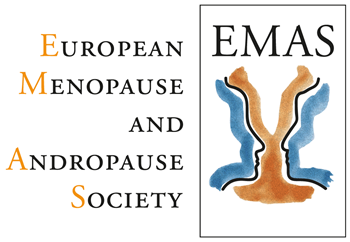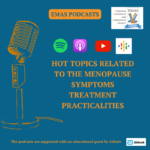Host: Welcome to today’s podcast Practicalities – When to start MHT and how long to treat. This episode is part of a podcast series supported by Abbott. The content is solely the responsibility of EMAS, the European Menopause and Andropause Society. All our episodes are available in English, Spanish, Mandarin, and Russian and you can find them on any of the most popular podcast platforms.
In today’s episode Dr. José Vázquez, Gynecologist and professor at Spanish Hospital and Universidad Nacional Autónoma de México will discuss the rationale for beginning Hormone Replacement Therapy, when to start, and for how long it is convenient to use. And will also reinforce the indications for the therapy.
Dr. José Vázquez: Hello, everyone. Today, we will be talking about an important topic: Menopausal Hormone Therapy – specifically, when to start and how long to use it.
Menopausal hormone therapy (MHT) is a treatment option with 4 indications: managing symptoms associated with menopause, such as hot flashes, night sweats, and vaginal dryness (genitourinary syndrome), Premature ovarian failure and prevention of postmenopausal osteoporosis
Who can benefit from MHT?
Not all women experience severe menopausal symptoms, and thus, not all require MHT. However, MHT can be particularly helpful for women experiencing intense symptoms that significantly interfere with their daily activities. It is recommended for women with moderate to severe symptoms who have no contraindications to hormone therapy.
The timing of starting MHT can be critical. Women who begin MHT closer to the onset of menopause tend to experience more benefits than those who start later. Starting MHT within ten years of menopause or before 60 years old can help relieve symptoms, such as hot flashes, sleep disturbances, and vaginal dryness.
Why is this timing important?
First, because it is the time when the woman might be more symptomatic, and second because it seems that the degenerative processes are not advanced and the health of cells is better, for example: the atherosclerotic process is not as advanced as to pose a coronary risk, but instead might be protective, as well as in the nervous system in which the neurons tend to be healthier (Health cell theory). When the degenerative processes have gone too far, the effects of MHT seem to be deleterious
There are different types of MHT available, including estrogen therapy, progestin therapy, and combined estrogen-progestin therapy. The choice of therapy depends on various factors, such as the presence or absence of the uterus and a woman’s individual health history.
It’s crucial to consult with a healthcare provider to determine the most suitable type of MHT. Determining the duration for which MHT should be used is essential for ensuring overall safety and effectiveness. Most experts recommend using the lowest effective dose for the shortest duration necessary to alleviate symptoms, although there is no specific limit to which time to use it and varies depending on individual circumstances, including symptom severity and risk factors for certain health conditions.
Like any medical treatment, MHT carries potential risks and benefits. On one hand, MHT can reduce menopausal symptoms and improve quality of life. On the other hand, long-term use may increase the risk of certain conditions, such as breast cancer, blood clots, and cardiovascular disease. It is important to weigh the individual risks and benefits with a healthcare provider and consider alternative therapies or lifestyle modifications.
Once MHT is initiated, regular check-ins with a healthcare provider are necessary to monitor its effectiveness and evaluate any potential side effects. Healthcare providers will assess whether continuing or discontinuing the therapy is appropriate based on an individual’s circumstances. It’s crucial to communicate openly and honestly with the healthcare provider throughout the treatment to ensure the best outcomes.
In summary, menopausal hormone therapy can be a beneficial treatment option for women experiencing moderate to severe menopausal symptoms. Starting MHT closer to the onset of menopause tends to provide the most benefits. The duration of MHT should be based on individual circumstances and regularly re-evaluated in consultation with a healthcare provider. Assessing the risks and benefits, as well as considering alternative therapies or lifestyle modifications, is important to make informed decisions about MHT.
Thank you all for your attention!
Host: Today, Dr. José Vázquez discussed the indications and when it is expected to have the best results with Menopausal Hormone Therapy. Timing is important in this topic: when to start, how long to use it, and when we should stop the treatment. Thank you for listening to today’s episode. We hope it will be valuable for your clinical and research practice. Stay safe.
[END]


